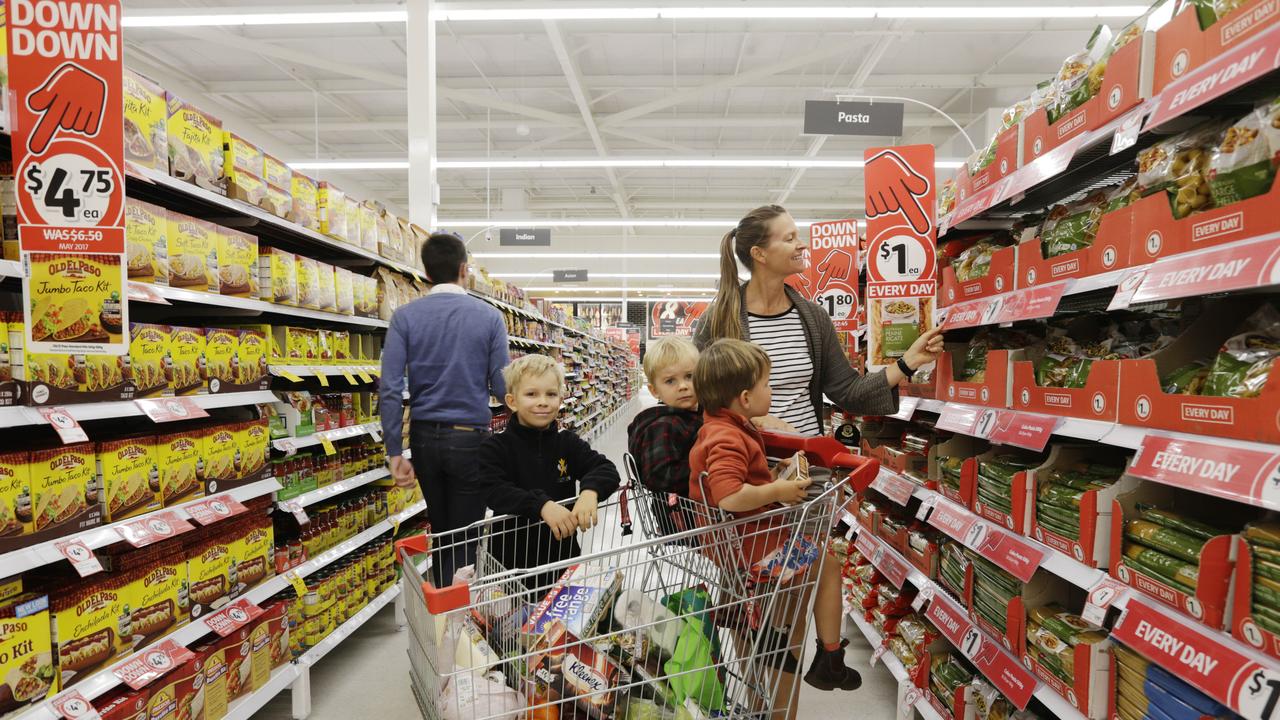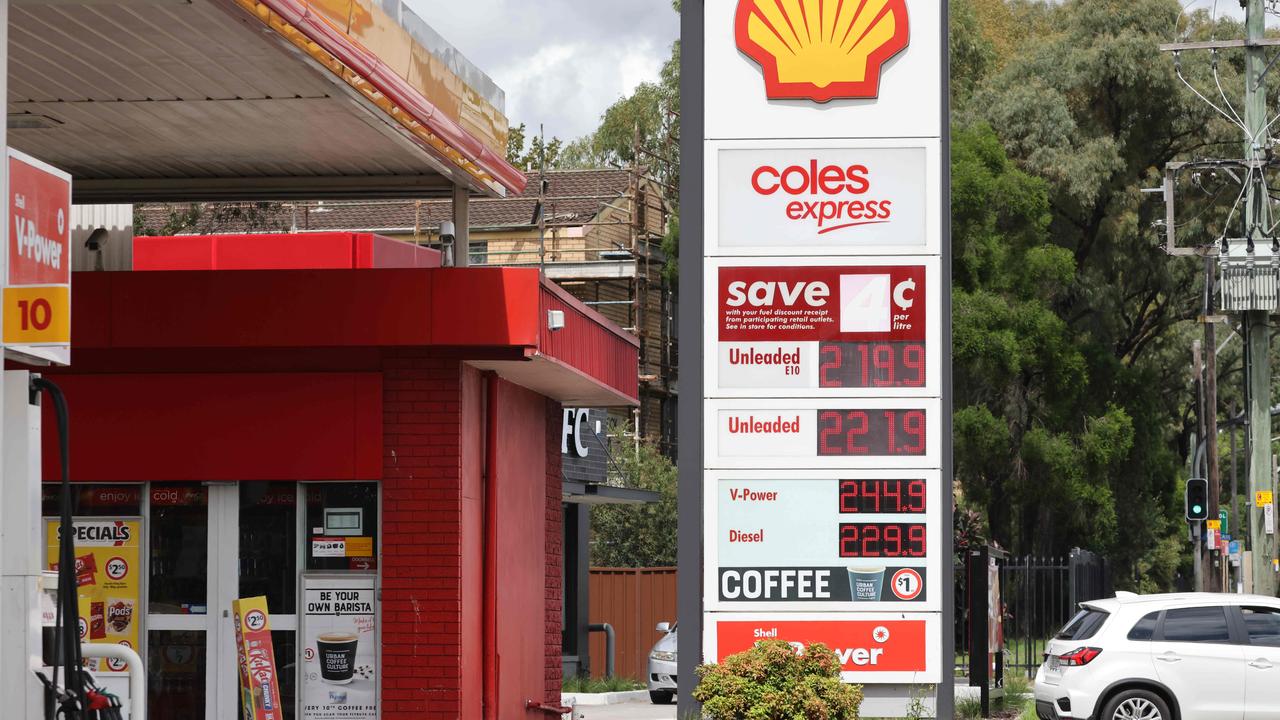How inflation ‘tsunami’ will impact Australians
Inflation is rising but what’s the impact on wages and is there anything you can do to avoid it? This is what you need to know.

Australians should brace themselves to pay more for everything with one business group warning of a “tsunami” of factors that will force up costs.
Supply chain disruptions, transport costs and the war in Ukraine are already impacting Aussies in areas that are hard to avoid – at the petrol pump and in the grocery aisle – and there’s likely to be more price increases to come.
EY Oceania senior economist Johnathan McMenamin spoke to news.com.au about what’s happening and whether people can reduce the impact to their budgets.
What is inflation?
An increase in the price of goods and services is known as inflation.
It is measured by the Consumer Price Index (CPI), which regularly analyses a set basket of goods and services, and tracks any price changes. Things included in this basket can be a loaf of bread and tank of petrol, but it can also include things many Aussies aren’t currently spending money on, such as the cost of constructing a new home.
This means inflation doesn’t have the same effect on every person.
“You might have a very large group of people who are not building a home for example, or who don’t own a car and might not be affected by petrol price increases. Others might be more exposed to rising food prices,” Mr McMenamin said.
Why is it going up?
Not everything in the basket of goods and services is rising in price at the same rate.
Some things like rent or electricity have remained fairly stable or dropped slightly in price.
Mr McMenamin said the reason for the latest increase in inflation was being driven by a few factors.
During the pandemic, demand for particular goods and services increased while at the same time supply was disrupted due to things like lockdowns in factory districts in China where goods were made, increased shipping costs and even a lack of availability of workers because people have had to isolate more.
Energy costs, such as the price of petrol, are going up and this means businesses may choose to pass this cost on to consumers.
At the same time, wages are increasing and this may also influence businesses to increase prices to cover this cost.

Why is inflation bad news?
Rising inflation means people won’t be able to buy as much with the same amount of money and this will make them feel their standards of living are declining.
“Being able to live and not worry about cost pressures is what most people look for,” Mr McMenamin said.
What does this mean for our wages?
Interestingly, inflation can drive up wages because people want more money to cover cost of living increases, but higher wages can also drive inflation even higher as employers try to recoup their costs – something called the “wage price spiral”.
Mr McMenamin said one way of breaking this spiral is with productivity increases.
“If workers become more productive then employers can provide higher wages without needing to pass on higher costs,” he said.
What you get then is real wage increases where wage rises are higher than the cost of inflation.
“This is how you generate improvements in standards of living,” Mr McMenamin said.
So far wages have been rising partly because they are in a period of recovery after the disruption of the pandemic when people had their wages frozen or hours cut.
The other reason is because unemployment is very low at the moment and is expected to decline even further, with many jobs being advertised.
“This puts pressure on employers to pay employees more to keep them and remain competitive with other businesses,” he said.

Will this change once overseas workers return?
While the closure of Australia’s borders during the pandemic definitely had an impact as it showed the country was heavily reliant on the supply of workers from overseas, Mr McMenamin said too much emphasis was put on this.
“What’s important to remember is the Federal Government, state governments and the RBA have put an unprecedented amount of support into the economy,” he said.
Government payments for businesses including JobKeeper and also for individuals, has fuelled demand in the economy and the need for more workers.
Dropping tax cuts could be good for our wages
The economy has already received a lot of stimulus (money from government) and Mr McMenamin said the average household was in pretty good shape, especially if they owned their own home as the value of property has skyrocketed, so things like bringing forward tax cuts is probably not needed for the economy’s health.
“I would argue it’s probably time to reinvest in productivity-enhancing investments, or to save that money,” he said.
“The issue with overstimulating the economy is that it can generate more inflation without delivering improvements in people’s living standards, and it will force the RBA to raise interest rates slightly earlier.”
Rising inflation could drive up interest rates
The RBA basically uses interest rates to try and keep inflation levels at a low and stable level as it doesn’t want to see cost of living rise dramatically and then crash, leading to a recession.
Raising interest rates helps to control inflation because it means people will spend more money on paying back their mortgages. It also pushes house prices down. This leaves people with less money to spend on buying things, decreasing demand and prices.
It will also increase the exchange rate for the Aussie dollar, making it cheaper to buy things overseas, which will also reduce demand locally.
Inflation is not all bad
Rising inflation shows that the economy is functioning at its potential.
“If there is no inflation, it means we are not producing or using all the resources that you have,” Mr McMenamin said.
“More people will be unemployed, there will be a lot of equipment sitting around not being utilised, and businesses will be offering discounts.”
However, too much inflation can be quite painful for people, which is why a low and stable rate is the ideal balance.
Will inflation continue to rise?
The RPA looks at ‘underlying inflation’ to make its assessment of whether to raise interest rates. This figure doesn’t include those goods and services that have experienced extreme price rises or declines, providing a better picture of average price rises.
In the 12 months to December 2021, CPI rose 3.5 per cent, which is within RBA’s target range of 2-3 per cent.
However, many economists believe inflation will continue to rise and go above that target within the next year.
This is partly because of continuing disruptions within supply chains and shipping costs, as well as wages growth. However, the RBA believes supply chain disruptions should eventually ease so it expects inflation to rise and then fall again.
An unpredictable factor will be the war in Ukraine, which has seen sanctions on Russia drive up energy prices and the cost of things like petrol.
“They may remain elevated for a long period of time or come down soon, there is a lot of uncertainty but it will put more pressure on inflation than was expected in (the RBA’s) February outlook.”

‘Tsunami’ to hit Aussies
The Australian Retailers Association has described the various pressures businesses are facing as creating a ‘tsunami’ that will drive up costs, which will have to be passed onto consumers.
Mr McMenamin said there were expectations Australia’s CPI of 3.5 per cent would lift closer to 5 per cent based on petrol price increases.
But he said this was significantly better than in America, where rates were around 8 per cent and expected to rise even further.
“Based on a global comparison it’s not so bad but it will certainly be much higher inflation than Australia has seen in a few decades – and people will feel that,” he said.
Petrol price increases in particular would likely mean inflation will touch every Aussie as businesses would probably pass on the cost, pushing up the price of food for example.
Those who own cars and need to buy petrol though will feel the pain even more.
How to beat inflation?
Doing things like buying locally grown food, or even buying an electric car, can help people to avoid huge price increases from rising petrol prices but it will be difficult to avoid any impact.
Mr McMenamin said things like looking for alternative brands could help household budgets but people should at the very least be prepared for price increases.
“Be aware that costs may increase a few per cent over the next few months or year,” he said.
“Make sure you have the money to buy those essentials – just being aware of it is a pretty critical thing.”
Can we stop inflation from rising?
The Federal Government has said it will focus on the cost of living in its next federal budget due on March 29. It’s also likely to be a key theme of the election, with Labor also promising measures to tackle this.
Mr McMenamin said these measures are unclear at the moment but the important thing is that they are temporary.
“They don't want to permanently change things in reaction to what should only be a temporary lift in the rate of inflation,” he said.
This is why some economists are cautioning against changes to the fuel excise as a way of bringing down petrol prices, as it could be difficult to reintroduce once it was removed.
However, other things like a one-off payment to vulnerable Australians could be one way governments help to relieve cost of living pressures.
Are you struggling with cost of living? Email charis.chang@news.com.au
Read related topics:Explainer






